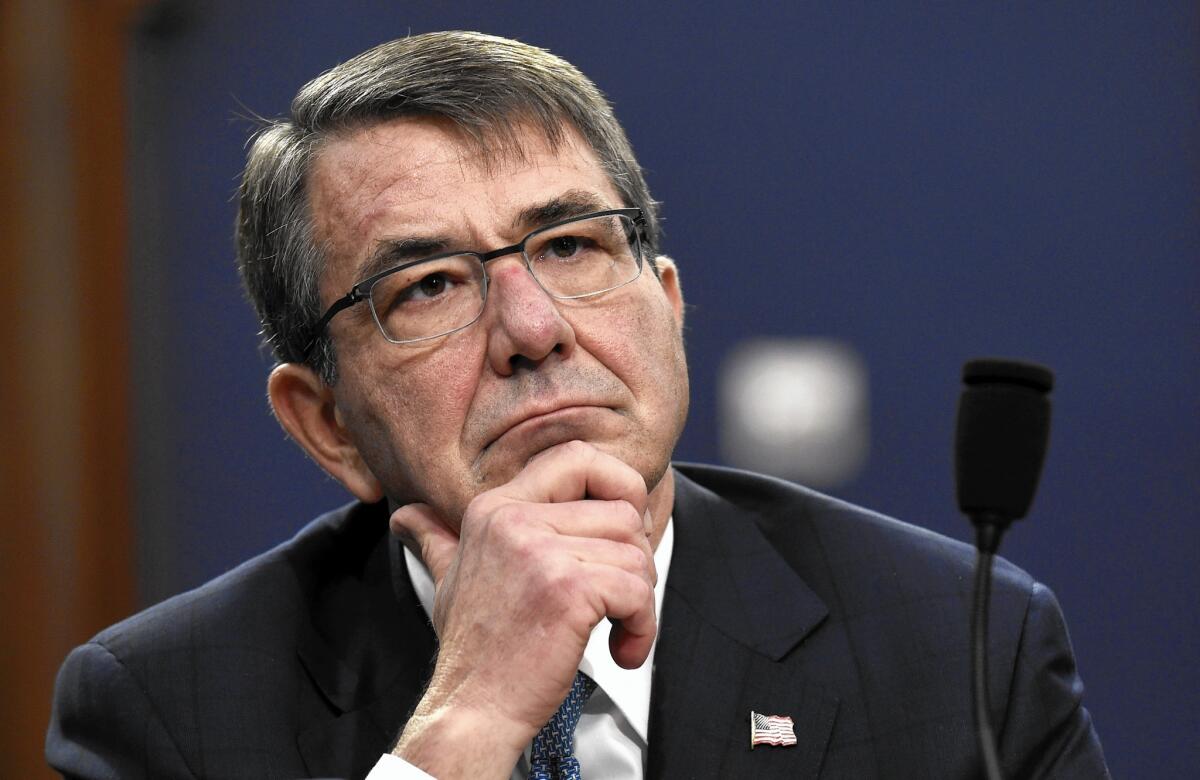Pentagon chief to appeal to Silicon Valley for help with cybersecurity

Reporting from WASHINGTON — Defense Secretary Ashton Carter will visit a crucial front this week in the war the Pentagon considers its greatest potential threat: cyberspace.
Carter will visit a Pentagon outpost in the heart of Silicon Valley, speak at a cybersecurity conference in San Francisco and go to Microsoft and Amazon headquarters in Seattle to highlight the risks of cyberattacks and the need for greater digital cooperation with the Pentagon.
His visit to the West Coast — his third in less than a year, more than he’s made to Kabul or Baghdad — marks the latest effort by the Obama administration to recruit telecommunications, social media and other technology companies as partners in national security operations despite deep suspicion in Silicon Valley about government surveillance.
MORE: Get our best stories in your Facebook feed >>
The distrust erupted in public after National Security Agency contractor Edward Snowden leaked details about the government’s vast domestic and overseas surveillance programs in 2013.
The gulf has widened in the weeks since the Justice Department asked a federal court to force Apple to write software so FBI agents could unlock an iPhone used by one of the killers in the Dec. 2 mass shooting in San Bernardino.
One hand of the government is reaching out to the valley, while another is poking them in the eye.
— Peter W. Singer, coauthor of the book “Cybersecurity and Cyberwar”
Most Silicon Valley companies are backing Apple in the dispute. They argue that an adverse ruling would spark a flood of requests for similar tools from local, state and federal prosecutors, and they fear it would make smartphones and other encrypted devices more vulnerable to hackers.
“One hand of the government is reaching out to the valley, while another is poking them in the eye,” said Peter W. Singer, a fellow at the nonprofit New America Foundation in Washington and coauthor of the book “Cybersecurity and Cyberwar.”
The debate will shift to Congress on Tuesday when James B. Comey, the FBI director, and Bruce Sewell, Apple’s general counsel, are scheduled to testify at a House Judiciary Committee hearing on the competing demands for security and privacy.
See the most-read stories this hour >>
The public focus on the FBI fight with Apple is “perhaps a positive outcome of an otherwise tense and sometimes divisive situation,” said Lillian Ablon, a cybersecurity analyst at the Rand Corp. in Santa Monica.
Carter’s trip, and a similar visit by Atty. Gen. Loretta Lynch, who will also speak at the cybersecurity conference, “seems like a step in the right direction” to bridge the divide, she said.
Carter, a physicist, is more tech savvy than his predecessors at the Pentagon. He taught at Stanford University, where Google, Yahoo and other major companies got started, and has sought to build relationships with the tech community since he took office a year ago.
Last spring, he flew to Silicon Valley — the first Defense chief to visit in two decades — to open the oddly-named Defense Innovation Unit-Experimental, which serves as a Pentagon incubator in the valley. He will visit the site Tuesday to review progress.
Pentagon aides hope Carter’s outreach to the fast-paced start-up culture can help fill gaps in U.S. cyberdefense efforts, and speed up development and procurement of digital tools — from robotics to artificial intelligence — to the military.
The military, of course, has its own hackers at U.S. Cyber Command, and other arms of the federal government — including the Homeland Security Department, Justice Department and intelligence agencies — are supposed to identify and track militants online.
Though much of the work is classified, the public effort is aimed at getting social media and tech companies to help counter and block online material used to recruit, radicalize and indoctrinate new militants.
“The Internet shouldn’t be used for that purpose,” Carter told a congressional hearing last week. “Why should they be able to communicate? Why should they be using the Internet?”
But stopping that communication is an immense challenge, said Monika Bickert, a Facebook executive who is in charge of ensuring that terrorist material is not posted on Facebook pages.
“We have billions of posts every day,” she said Friday at the nonprofit Washington Institute for Near East Policy.
Twitter, which also has a zero tolerance policy for pro-terrorist tweets, said this month it had suspended more than 125,000 accounts. But blocked users often pop up with new handles and new accounts.
Twitter is “the heart and soul of cyber jihad,” said Steven Stalinsky, executive director of the Middle East Media Research Institute, a nonprofit group in Washington that tracks Muslim extremists online.
But a study this month from a project on extremism at George Washington University concluded that Twitter’s effort had helped slow Islamic State’s reach in cyberspace because the new accounts had fewer followers.
NEWSLETTER: Get the day’s top headlines from Times Editor Davan Maharaj >>
J.M. Berger, a coauthor of the report, points to Asawirti Media, a Twitter account holder that has been suspended more than 440 times.
Each time the account pops back, it starts with zero followers, Berger said. In September 2014, Asawirti Media had 81,000 followers; its latest iteration has 1,000.
Tech companies “probably could do more, but it verges on impossible to completely wipe these guys off social media networks,” said Berger, author of the book “ISIS: The State of Terror.”
“There seems to be a wish on behalf of the government to offload the job of quieting extremists to Silicon Valley,” he said. “But they need to understand that no one starts a social media company to become the world’s morality police.”
ALSO
What a Donald Trump presidency might actually look like
Supreme Court okays California’s use of ‘unclaimed’ cash
Why Trump and Sanders are praising healthcare in other countries
More to Read
Sign up for Essential California
The most important California stories and recommendations in your inbox every morning.
You may occasionally receive promotional content from the Los Angeles Times.











